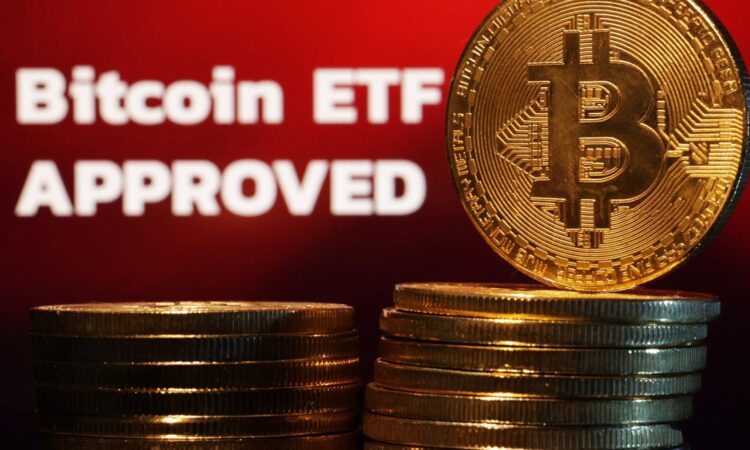
On January 10, the US securities market regulator, the Securities and Exchange Commission (SEC) allowed 11 spot Bitcoin exchange-traded funds (ETFs) to list and trade on the stock market. This has opened a window for retail investors to trade safely in a digital token. The future of cryptocurrency has been hanging between the ban-it or regulate-it debate. With this step, it looks as if the regulate-it argument has won. Though the United States (US) has opened the doors for legitimising the trading of a digital token, India need not rush in just yet. And investors need to understand that this is a high-risk speculative trade, not an investment.
The Bitcoin ETF approval is significant because now Bitcoin will be traded much like gold, silver or any other commodity-based ETF. An ETF is a mutual fund that is listed on the stock market and its price mimics the price of a commodity or an index. This opens the door to retail investors trading in a cryptocurrency much like they do any other asset. Till now the trading in crypto was done through unregulated exchanges that put investor money at risk. The risk was brought home with the collapse of the $32-billion FTX crypto exchange in November 2022 that vapourised investor money as the exchange owner, Sam Bankman-Fried, dipped into client funds to prop up his hedge fund.
Investors who want to trade in Bitcoin now have a much safer route than earlier through the regulated part of the market. But the question is, should they be investing in it at all? SEC chairman Gary Gensler himself seems unconvinced by this but was nudged by the courts to allow Bitcoin ETFs. In a statement issued the day he cleared the Bitcoin ETFs, he wrote: “Though we’re merit neutral, I’d note that the underlying assets in the metals ETFs have consumer and industrial uses, while in contrast, bitcoin is primarily a speculative, volatile asset that’s also used for illicit activity including ransomware, money laundering, sanction evasion, and terrorist financing.”
While regulators are wary of a private code-linked digital token that has value because enough people demand it, and not because it has any underlying asset, the global debate is veering towards regulating cryptocurrencies rather than banning them. In fact, the G20 Delhi declaration, to which India is a signatory, also tilts towards regulation. The declaration says that the crypto assets must be subject to: “…regulation, supervision and oversight.”
As policymakers and regulators grapple with this new entrant in the global financial arena, we must understand that there are two different aspects of a digital currency. One is as a means of transaction and the other is as a store of value. The use case for a low-cost and instant means of international transfer of money is obvious when you see the huge costs of money, time and paperwork the current bank-based system imposes on people. Anybody who has sent money abroad knows how cumbersome and expensive the process is. A World Bank report puts the average cost of sending $200 from one country to another at $12.50 or a huge 6.25% in 2023.
While the use of a digital token is one route to reducing this cost, sovereign nations would not like to hand over control to a private token over which they have little control. To overcome this, some countries are experimenting with linking their domestic payment systems to facilitate global transactions. The Bank for International Settlements (BIS) Innovation Hub in Singapore, for example, is experimenting with a multilateral network called Nexus, which connects multiple domestic instant payment systems. Already Italy, Malaysia and Singapore are working together to see if this can work.
While the transaction piece might be solved by a global government-to-government multilateral handshake, it is the role of cryptos as an asset that needs some debate. Die-hard crypto fans say that it is the asset class of the future and naysayers like me say that since there is no underlying asset giving value to these digital tokens, the value is only because there is a demand for its own sake.
The green signal to allow a Bitcoin ETF in the US will put pressure on other markets, especially India, where there is a large appetite for get-rich-quick schemes, to allow similar products. The governor of Reserve Bank of India has said that there is no plan to do so in the near future. But this decision will be left to the ministry of finance with the regulator being the Securities and Exchange Board of India who would have to put down rules for such a product. Given the nascent nature of financialisation in India and the lack of financial literacy, it would be a mistake for India to open the door to a highly speculative product. We should wait and watch and allow other countries to experiment with it before we take a call.
Retail investors must understand that this is a highly speculative product that forms just a tiny part of the portfolios of the super-rich. To break fixed deposits to channel large chunks of money into crypto will be a big mistake for the average retail investor in India. Beware.
Monika Halan is the author of the best-selling book Let’s Talk Money. The views expressed are personal






